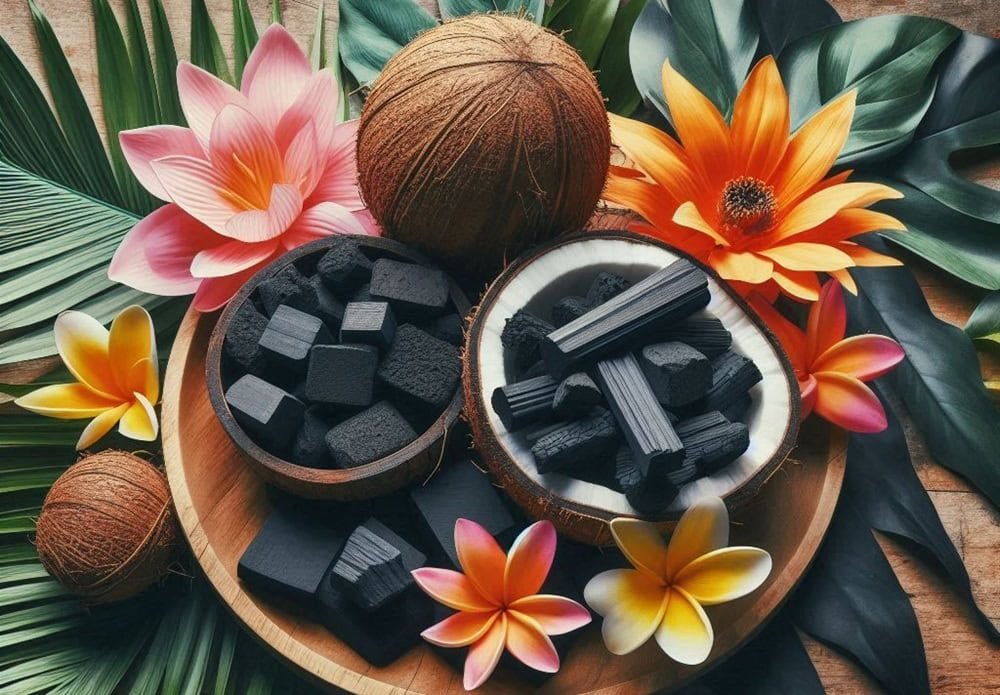
Looking for coconut charcoal Vs wood charcoal guide?
To obtain any type of charcoal, be it coconut charcoal or wood charcoal. The source materials go through a steam activation process to get the desired charcoal. The blog will differentiate between coconut charcoal and wood charcoal and will discuss how they are applicable to different applications. Other types of charcoal include Charcoal briquettes, activated charcoal, bamboo charcoal, and biochanin, which we will be discussing some other time.
The blog will help you decide which charcoal best suits your needs and which would give you the maximum value
Coconut Charcoal
- Coconut charcoal, as the name suggests, is obtained from a coconut shell. The coconut shells are passed through a steam activation process known as pyrolysis, which gives coconut charcoal as a final product. It should be noted the process of producing coconut charcoal is carried out at a low oxygen level, which results in coconut charcoal that has a high content of carbon and is considered an eco-friendly charcoal option.
- Now, if we talk about why coconut charcoal is labeled as a sustainable and eco-friendly option, the reason is coconut charcoal is obtained from the by-product of coconut. The coconut shells, which were once considered waste, are now a source of coconut charcoal, this not only helps in reducing waste from the coconut industry but is also proven a great alternative to traditional charcoal.
- If we have a look at the physical appearance of coconut charcoal, it is harder and cannot be crushed or cracked easily as compared to wood charcoal. It tends to have a larger surface area, more contents of carbon, and great absorption properties.
- The most useful application of coconut charcoal is for water filtration, as discussed earlier, coconut charcoal is good at absorbing impurities from the water. Apart from water filtration, it is also used for purifying air and absorbing dirt and pollutants from the air.
- Interestingly, coconut charcoal has certain health benefits as well. It can be used as a great body detoxifier to protect the human body from any potential toxins.
- Coconut charcoal has a number of uses and applications. The most common are water purification, detoxification and health, Skincare and beauty, and oral care. It is also used as a fuel source and used in barbecue coal and hookah coal. Other uses include Air Purification, Deodorization, Pavement filler, and environmental sustainability.
- Top exporters of coconut charcoal are Indonesia, Vietnam, and India.
- Coconut charcoal can be expensive and time-consuming to ignite. On the other hand, it can cause respiratory problems and constipation, and needs can be hazardous.
Wood Charcoal
- Wood charcoal is making its position in the charcoal industry, and what makes it unique and applicable is its great absorption properties, non-toxic nature, and greater surface area, allowing it to be used in several applications.
- It is clear enough that wood charcoal is extracted from a certain wood type and sawdust. Talking about the physical properties, in comparison to coconut charcoal. Wood charcoal is less dense and can easily be cracked or crushed.
- It is lightweight and has a porous structure, making it a good absorbent. However, the large surface area of wood charcoal makes its contamination easy. Therefore, it should be stored carefully to prevent exposure to dust and soil.
- The most common application of wood charcoal is in cooking and grilling. It gives a good taste to the food and can be considered a great replacement for traditional charcoal for grilling and cooking purposes.
- Wood charcoal is brought into use for the production of metals as a reducing agent. Hence, it is considered a useful element in the metallurgical industry.
- Just like coconut charcoal, wood charcoal can also be used for water filtration and purifying because of its absorption capabilities.
- Apart from these applications, wood charcoal has immense usage in the food and pharmaceutical industry.
- The top exporters of wood charcoal are Indonesia, China, Poland, the Philippines, and Ukraine.
- The downside of using wood charcoal is environmental concerns like deforestation and greenhouse gases. It can also pose a potential health risk, which includes respiratory problems and carbon monoxide poisoning.
We hope that a detailed explanation will help you decide the best available charcoal. Both types of charcoal have their advantages and have different uses. In a nutshell, coconut charcoal can be preferred more as it is eco-friendly and extracted from the coconut shell leftovers, making it a sustainable product.
Editorial Staff
Editorial Staff at Earth Scape are experts in coco peat.
